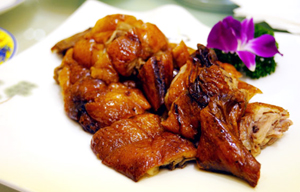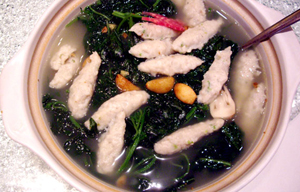Toward a cleaner, greener eating habit
Updated: 2013-07-05 07:04
By Kavi Chongkittavorn (China Daily)
|
|||||||||||
I thought I was witnessing an important social phenomenon that would have a huge impact on the eating habits of Chinese in the decades to come. "Clean Your Plate" screamed the message from the middle of a Ming-motif dinner plate in a half-page advertisement in China Daily's July 1, 2013 edition. It was part of the "clean your plate movement", which in Chinese is called guangpan xingdong.
The ad is a clear indication that the Chinese government is pushing the envelope for its 1.3 billion people to "uphold the virtue and foster new practices", one of which is to eat all the food on your plate. This also is an important step toward stopping wastage of food.
What I see in China today is a far cry from my first visit to the country - Wuhan in Hubei province, to be precise - in 1977 as a young student. I used to use liang- piao (food coupon) to get a meal because food was then rationed.
The memory of one lunch will remain with me forever, because I was lucky enough to have rice with vegetable soup, which comprised not only cabbage but also a few slices of pork rind. At that time, pork rind was treated as meat and added to vegetables or soup because meat was not widely available. So scare was food that whenever a person left anything on his/her plate, someone from outside the dining area would rush in and clean the leftover or put it in a cotton bag - nothing went to waste.
A lot has changed in China since 1977. Along with China's economic development and modernization have come some problems, of which wastage of food is one.
But during this visit to China, I have noticed a drastic change in the eating habits of Chinese people, especially the young generation. There has been a proliferation of Chinese fast food restaurants in China over the past couple of decades. But the irony is that despite some of them being guilty of serving unhealthy and fattening food, fast-food outlets help prevent wastage of food. When a diner is alone - which a large percentage of fast-food customers are - he/she rarely orders excessive food. Perhaps money has something to do with.
After watching young Chinese ordering food, I realized that wastage of food in Chinese fast-food restaurants is minimal because each portion is measured and one order is normally for one person. A lunch or dinner costs about 25 yuan ($4) and comprises one main dish - usually chicken, pork or beef - and two side dishes of perhaps mixed vegetables and soup, and the staple of rice. This way the Chinese fast-food restaurants have unintentionally prevented wastage of food.
The problem arises when Chinese people dine together. Austerity and cost are tossed out of the window when, sitting on huge round tables, they begin ordering almost every dish on the menu without realizing that they cannot finish even half of them. Some argue that a dining table that is not full is an insult to the guest. Besides, hosts don't want to risk losing face by not having more than enough dishes on the table.
But now that the new leadership has given a call to stop wasting food, hopefully Chinese people will change their ways. After being elected the top leader of the Communist Party of China at the end of last year, Xi Jinping urged Chinese officials to follow eight rules to practice austerity and give up their waste-generating habits. The rules include not wasting food and living moderately. In fact, the entire Chinese population should follow these rules.
China's ability to feed its huge population is an extraordinary achievement. Now, China wants to go beyond that and give its people a more sustainable and greener way of life. Chinese people, for centuries, have been in the habit of saying, chi duo yi dian (eat a bit more), to guests at the dinner table. But there may come a time when shao chi ye ke yi (it is okay to eat less) would be the acceptable entreaty.
The author is assistant group editor of The Nation in Thailand.
(China Daily 07/05/2013 page9)
Related Stories
China to ban 13 kinds of chemical-laden health food 2013-06-25 10:40
Health food companies warned over false ads 2013-06-08 10:56
Your hometown can affect your health 2013-06-08 10:09
Low carbohydrate diets may harm your health 2013-05-21 14:00
Health food fraud targeted 2013-05-17 10:21
Today's Top News
EU and US set for free trade negotiations
Top judge underlines justice
China to protect memorial sites for martyrs
KMT vets who fought Japanese are saluted
Hangzhou five seek delayed justice
Workers confine four managers in dispute
'Tiny Times' turns up the heat on summer screens
Russia not to decide Snowden's fate
Hot Topics
Lunar probe , China growth forecasts, Emission rules get tougher, China seen through 'colored lens', International board,
Editor's Picks

|

|

|

|

|

|







